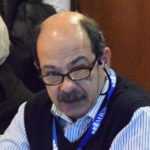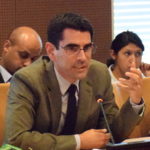 Attila Hancioglu, Global MICS Coordinator, UNICEF
Attila Hancioglu, Global MICS Coordinator, UNICEF
“Recently, of course, as a result of all our efforts, we were pleased to see that multidimensional poverty has taken its deserved place in the SDG framework.” Hancioglu provided the welcome news that due to the mainstreaming of MPI it would be included as a standard part of MICS survey reports together with child poverty indicators.
“Our work is going to intensify in general. We are very pleased to have seen specifically on MPI a number of child-specific MPIs in a number of countries, including Malaysia, Vietnam, El Salvador, and Rwanda. And including the report, which was released last year, for Bhutan on a child-specific MPI”.
 Xavier Mancero – Senior Statistician, Economic Commission for Latin America and the Caribbean
Xavier Mancero – Senior Statistician, Economic Commission for Latin America and the Caribbean
Mancero presented a new project they have jointly with UNESCWA and other UN agencies and the Secretariat, in which one component will address multidimensional poverty and proposing new questions to address common challenges in household data sources for MPIs. He observed “what we see is we already have the support to build a National MPI, but then we are very limited usually by the data we have in the household surveys. So, we have indicators of access and not quality… Or there are dimensions of poverty that are not considered in these surveys.” The fundamental question they face is this: “Now that we have the multidimensional poverty index, how do we measure it better? How do we measure the dimensions that are lacking or come closer to what we want to know about the poor population?”
— — — — — — — —
About National and Global MPIs:
Governments such as Mexico, Colombia, Bhutan, Chile, Costa Rica, El Salvador, Ecuador, Honduras, Pakistan and Armenia use official multidimensional poverty indices (MPIs) as an official statistic of poverty. Each national MPI is tailor-made to the national context. For example, its design may reflect the constitution, or national development plan, or a participatory exploration of what poverty means. The national MPI may be computed using the same survey as income poverty metrics, or a different survey. It may be updated annually or every 2 years. Each national MPI is an official poverty statistic, but an effort is made so that it is used to inform and energise policy.
Yet not all governments have national MPIs. Even when they do, national MPIs cannot be compared. So there is a value-added to having a comparable global MPI across developing countries and/or universally, with extensive and disaggregated information on the composition of poverty for different groups. A global MPI for developing countries has been estimated by OPHI and the UNDP’s Human Development Report Office, and disaggregated for 1,300 subnational regions, as well as by variables like age and rural-urban areas. The global MPI might be particularly useful for SDG target 1.2 of halving multidimensional poverty, and potentially by countries without tailor-made National MPIs at the present time.
About the Multidimensional Poverty Peer Network (MPPN):
This event was co-hosted by the Multidimensional Poverty Peer Network (MPPN), a group of senior representatives from over 50 governments and international institutions, and its Secretariat, OPHI.
The Multidimensional Poverty Peer Network was launched in June 2013 at a distinguished event at the University of Oxford, at which President Juan Manuel Santos of Colombia and Professor Amartya Sen gave keynote addresses. The network was established in response to demand for information on implementing multidimensional measures, and for technical and institutional support. The Network Steering Committee includes Ministers and senior government officials from China, South Africa, Mexico, and Colombia as well as from OPHI.
Important Info:
- Presentations and remarks
- Photos
- Agenda
- Where: United Nations, New York
- When: Tuesday, 7 March 2017
- Hashtag: #UN48SC #UNStats
- Website














Recent Comments